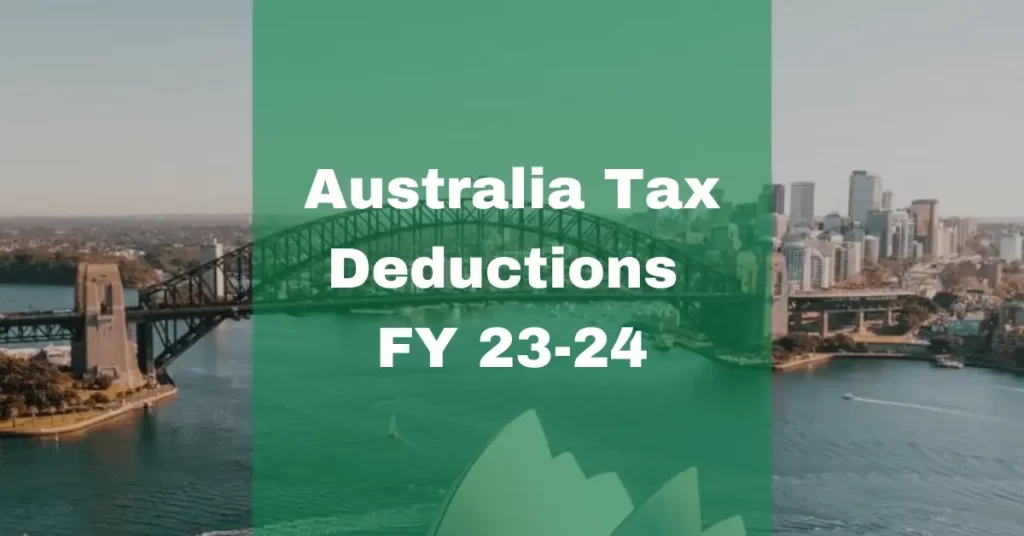
As we embark on another financial year, Australian taxpayers need to stay informed about Australia tax deductions and effective strategies to make the most of their tax returns. Having a grasp of tax deductions and knowing which expenses are eligible for claims can greatly influence your circumstances. In this blog post, we will delve into the realm of tax deductions in 2023, explore their functionality, examine different expenses that qualify for claims, and offer valuable tips to help you optimize your tax return.
Tax deductions refer to expenses that individuals can use to decrease their income, thereby reducing the amount of tax they’re liable for. In Australia, the Australian Taxation Office (ATO) permits taxpayers to claim deductions for expenses incurred throughout the year that are associated with earning income.
Tax deductions function by reducing the amount of income you have. Of being taxed on your earnings you can deduct eligible expenses from your income. This leads to a decrease in your income and, consequently, a lower tax obligation.
Here are the types of Australian tax deductions and their eligibility and requirements that you should keep in mind;
1.1. Car Expenses:
1.2. Travel Expenses:
1.3. Uniforms and Work Clothing:
1.4 Self-Education Expenses:
2.1. Deductible Interest, on Investment Loans:
2.2. Expenses for Rental Properties:
2.3. Expenses for Shares and Managed Funds:
3.1. Tax Relief for Medical Expenses (TRME):
4.1. Organizations Eligible for Tax Deductible Donations:
5.1. Home Office Expenses:
5.2. Income Protection Insurance Premiums:
By utilizing deductions, you have the opportunity to decrease your income, which in turn will help lower your tax liability and the amount you owe in taxes.
According to the Australian Taxation Office (ATO), if you are lodging your tax return for the year 2023, you can lodge it by 31st October. If you are getting it lodged by a registered agent, they have access to lodge your tax return later than 31st October also, but for this, you need to engage the agent before 31st October 2023.
To make the most of your tax return, here are some tips you should consider;
It’s important to keep records of your income and expenses throughout the year. This will help support your claims and ensure you don’t miss out on any deductions.
Familiarize yourself with the guidelines provided by the ATO regarding which expenses can be claimed as deductions. By knowing what you can claim you’ll be able to take advantage of all deductions.
Consulting a tax professional or accountant can provide personalized guidance based on your specific financial situation. They can assist in identifying any overlooked deductions. Offer advice on optimizing your tax return.
If you have job-related expenses remember to claim all deductions related to them. This may include vehicle expenses, memberships, training costs, and other relevant expenditures.
It’s crucial to stay up to date with any changes in tax laws and regulations. By staying informed, you can benefit from deductions or adjustments that may apply in 2023.
In addition to deductions, there are tax offsets and rebates that you can take advantage of. These include the Middle Income Tax Offset (LMITO) or the Seniors and Pensioners Tax Offset (SAPTO), which can help reduce your tax liability.
Consider contributing to your superannuation account to benefit from the tax advantages associated with contributions. By doing you may be able to lower your income while simultaneously boosting your retirement savings.
If feasible, it might be beneficial to prepay deductible expenses before the end of the financial year. This could involve paying interest on investment loans or income protection insurance premiums in advance. By taking this approach, you can accelerate your deductions for the year.
Take some time to review your investment portfolio and consult with an advisor if necessary. Optimizing your investment strategy could potentially lead to increased deductions and an overall improvement in your position.
Develop a habit of keeping records and organizing all relevant financial documents throughout the year, not just during tax season. This will make it easier and more efficient when it comes time to prepare your tax return.
You can claim deductions for work-related expenses when you work from home. This includes a portion of your utility bills, internet costs, and even the depreciation of any home office equipment you use.
To determine the deductions for self-employment expenses, it is important to maintain records of all your business-related expenditures. It would be advisable to seek assistance from a tax professional or an accountant who can provide guidance throughout the process and assist in identifying which expenses are eligible for deductions.
Yes, there are restrictions on the extent to which you can claim deductions for donations. It’s crucial to acquaint yourself with the guidelines provided by the Australian Taxation Office (ATO) since the maximum deductible amount can differ based on factors such, as the nature of the organization and the method of donation.
Absolutely! You’re eligible to deduct education expenses even if you’re studying part-time. The key is that the course should be directly relevant, to your job or help you enhance and maintain your skills in your profession.
Filing misleading information on your tax return can lead to penalties, interest fees, and potential legal ramifications. It is crucial to verify the accuracy of your claims back them up with documentation and adhere to the guidelines provided by the ATO.
Understanding the tax deductions available in Australia and employing effective strategies to make the most of them can greatly influence your financial stability. It’s important to familiarize yourself with deductions stay organized and seek advice when necessary to ensure you maximize your tax return, for the year 2023. Keep in mind that consulting a tax professional will provide you with the information and personalized guidance tailored to optimize your unique tax situation.
Contact us to learn more about how we can help you!
Hello,
Thanks for visiting our website!
How can we help you?
Start the chat
WhatsApp us